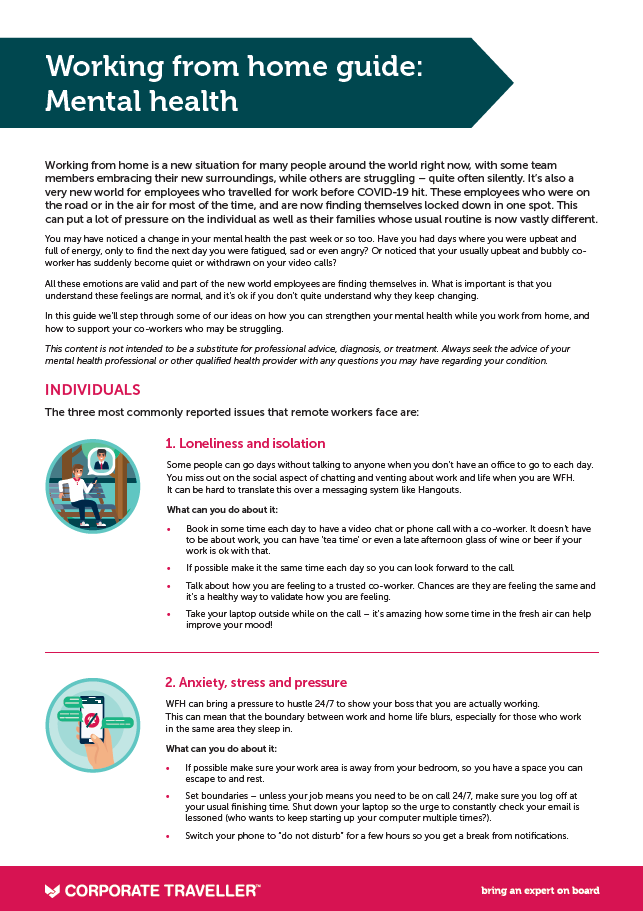
Working from home is a new situation for many people around the world right now, with some team members embracing their new surroundings, while others are struggling – quite often silently. It’s also a very new world for employees who travelled for work before COVID-19 hit. These employees who were on the road or in the air for most of the time, and are now finding themselves locked down in one spot. This can put a lot of pressure on the individual as well as their families whose usual routine is now vastly different.
You may have noticed a change in your mental health the past week or so too. Have you had days where you were upbeat and full of energy, only to find the next day you were fatigued, sad or even angry? Or noticed that your usually upbeat and bubbly coworker has suddenly become quiet or withdrawn on your video calls?
All these emotions are valid and part of the new world employees are finding themselves in. What is important is that you understand these feelings are normal, and it’s ok if you don’t quite understand why they keep changing.
In this guide we’ll step through some of our ideas on how you can strengthen your mental health while you work from home, and how to support your co-workers who may be struggling.
This content is not intended to be a substitute for professional advice, diagnosis, or treatment. Always seek the advice of your mental health professional or other qualified health provider with any questions you may have regarding your condition.
Individuals
The three most commonly reported issues that remote workers face are:
1. Loneliness and isolation
Some people can go days without talking to anyone when you don’t have an office to go to each day. You miss out on the social aspect of chatting and venting about work and life when you are WFH. It can be hard to translate this over a messaging system like Hangouts.
What can you do about it:
- Book in some time each day to have a video chat or phone call with a co-worker. It doesn’t have to be about work, you can have ‘tea time’ or even a late afternoon glass of wine or beer if your work is ok with that.
- If possible make it the same time each day so you can look forward to the call.
- Talk about how you are feeling to a trusted co-worker. Chances are they are feeling the same and it’s a healthy way to validate how you are feeling.
- Take your laptop outside while on the call – it’s amazing how some time in the fresh air can help improve your mood!
2. Anxiety, stress and pressure
WFH can bring a pressure to hustle 24/7 to show your boss that you are actually working. This can mean that the boundary between work and home life blurs, especially for those who work in the same area they sleep in.
What can you do about it:
- If possible make sure your work area is away from your bedroom, so you have a space you can escape to and rest.
- Set boundaries – unless your job means you need to be on call 24/7, make sure you log off at your usual finishing time. Shut down your laptop so the urge to constantly check your email is lessoned (who wants to keep starting up your computer multiple times?).
- Switch your phone to “do not disturb” for a few hours so you get a break from notifications.
3. Depression
Depression can kick in when you feel stuck, or you feel like you aren’t achieving as much as your co-workers. If not kept in check, anxiety, stress and isolation can lead to depression or make it worse.
What can you do about it:
- Actively manage your anxiety and stress levels. Find healthy ways to do this, like going for a walk, speaking to a friend or co-worker, eating foods that boost your mood and hydrate, hydrate, hydrate (with water…not alcohol!)
- Reach out to your GP or a therapist to discuss further steps you can take to investigate how you are feeling, and to find solutions to help you manage it.
- Make sure to utilise your work’s EAP provider – you may have access to free counselling and resources, so dive right in!
Other resources
There are literally hundreds of apps and websites to help you manage your mental health. We’ve cherry picked our favourites to get you started. Remember to check with your company’s EAP provider, quite often they will have their own app with super helpful info:
- Calm
- Headspace
- Insight Timer
Leaders
Being a leader is usually a pretty important role. But when your entire team is transplanted to different locations, it gets even more important!
- First things first – you need to understand that it’s not business as usual. The way you managed your team before is probably out the window, and you will need to create new structure and communication channels.
- An important part of your job during this COVID-19 crisis is to check in on your team and offer support where you can. It’s critical that you take the time to check how people are adapting, and foster an environment where if a member of your team is struggling, they know where to go to for help.
- If you have team members who travelled a lot for work before COVID-19, it’s very important you check in to see how they are adapting to being back home 24/7. There could be extra pressure on them not only work wise, but also in their personal life.
What can you do about it:
- Book in a team video or phone call at the same time each day. This will give employees who are usually on their own time to speak with others, and routine is a great way to provide feelings of security.
- Notice people’s moods – are they withdrawn? Do they seem angry or stressed? Reach out to them after the call to talk it through.
- Create a list of helpful resources and send to your team – check out the list in the individuals section for inspiration.
- Create some fun – book in a video call that is mostly social. Maybe have a virtual breakfast, or cocktail hour. Get people to bring their pets on the video call. Even if it feels a bit strange to you, your team will likely love it. Give it a go!
Remember, it’s okay to reach out if you need to. If you or someone you know is struggling, there is free help available. Free call or text The Mental Health Foundation of NZ on 1737 any time, 24 hours a day. You can also call Lifeline on 0800 543354 or text HELP to 4357.
